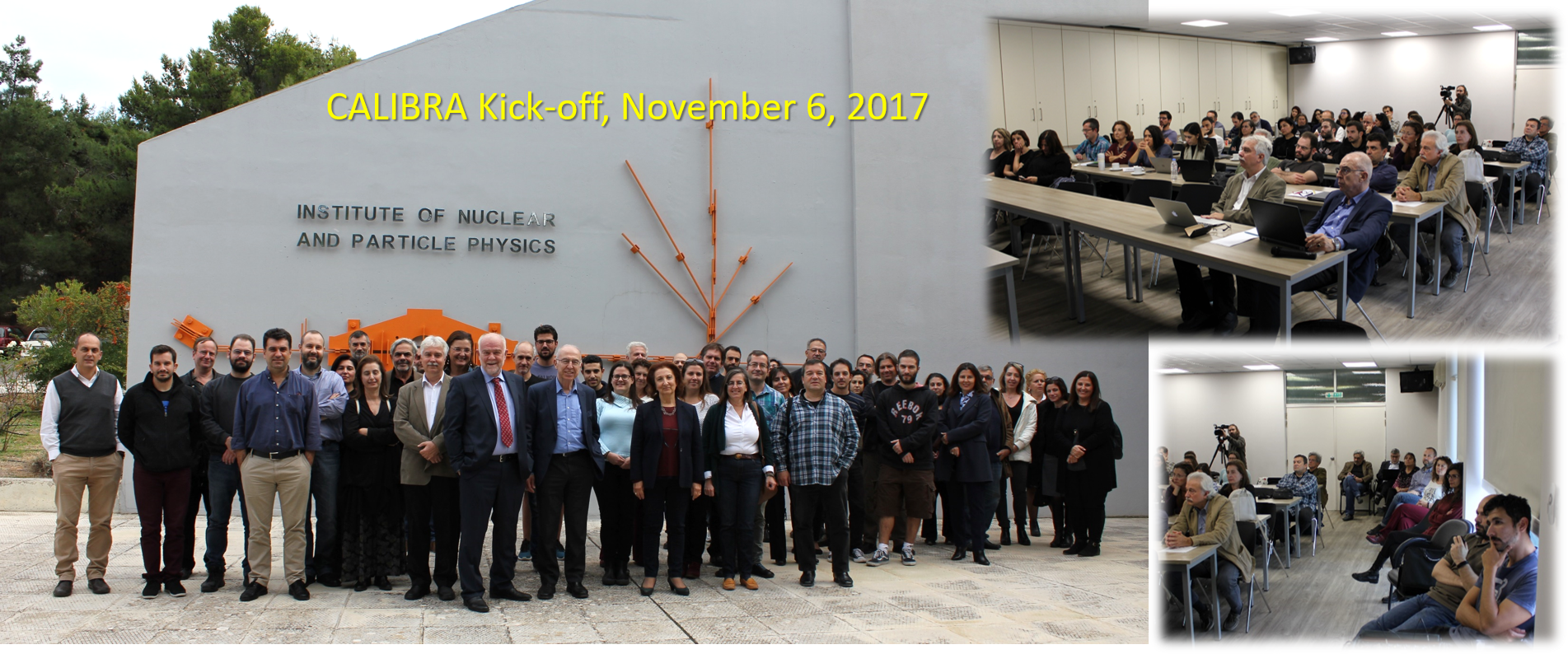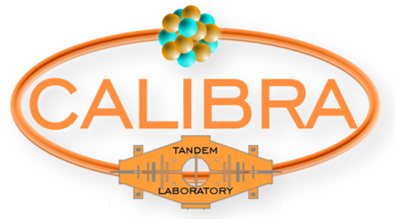The CALIBRA project at a glance
The CALIBRA project (MIS 5002799) is implemented under the Action “Reinforcement of the Research and Innovation Infrastructures” which is funded by the Operational Programme “Competitiveness, Entrepreneurship and Innovation” (NSRF 2014-2020) and co-financed by Greece and the European Union (European Regional Development Fund). CALIBRA is implemented at the Tandem Accelerator Laboratory of the Institute of Nuclear and Particle Physics (INPP), one of the five research institutes of the National Centre for Scientific Research “Demokritos”, Athens, Greece. The project had its kickoff meeting in November 6, 2017, that was attended by more than 60 scientists from 17 Greek research performing institutions and state organizations.

Calibra Kick-off meeting
CALIBRA stands for “Cluster of Accelerator Laboratories for Ion-Beam Research and Applications”, which is the title of the proposal submitted in 2013 to the General Secretariat for Research and Technology (GSRT), the Greek funding agency, within its call for the establishment of the national roadmap of research infrastructures. The CALIBRA proposal has been evaluated by an international expert committee as an excellent proposal with a score of 19/20. This score ranked CALIBRA in the top ten position in the list of 75 evaluated proposals that were submitted by scientists from all scientific disciplines.
The project aims at establishing and operating an accelerator-based research infrastructure open to the national and the European scientific community to conduct research at excellence level, develop innovative applications of increased socioeconomic impact, provide highly-specialized services, unique at the country level, to the public and private sector. CALIBRA strives for contribution to the goals of the National Strategy in Research and Technology regarding the country’s thematic priorities for smart specialization (RIS3), with emphasis in human health and radiopharmaceuticals, future energy sources, materials of technological interest, cultural heritage, environmental monitoring and the development of instrumentation and its testing under harsh irradiation environments.
The basic project milestones are:
- the complete upgrade of the Tandem and PAPAP accelerators, the two unique accelerators operating in the country,
- the transfer of a donated Cyclotron from the Netherlands to “Demokritos” and the preparation of a suitable laboratory for the production of PET radioisotopes for R&D activities matching the needs of the scientific community,
- the procurement, installation and commissioning of state-of-the art scientific instruments,
- the enlargement of the existing user community formed during the last decade around the Tandem accelerator, also with scientists from abroad, and
- the offer of unique education and training opportunities to students through research at the Tandem accelerator laboratory and associated facilities.
During the course of the project, Joint Research Activities (JRAs) will be developed through the upgrade works and the installation of the new scientific instruments as well as the development of innovative analytical techniques. In parallel, Networking Activities (NAs) will enhance synergies among Greek scientists and their colleagues abroad and will promote interaction between the scientific community and the private sector. JRAs and NAs are supported with almost 620 kEuros and the project management with 120 kEuros. The funds for the remaining activities (upgrades and new instruments) amount to approx. 2.68 million Euros. CALIBRA is broken down in seven sub-projects with the first one containing only the JRAs, NAs and the Management. This first sub-project («Αυτεπιστασία») is implemented through 12 work packages corresponding to seven JRAs, four NAs and the management. The remaining six sub-projects focus solely to the acquisition through tender procedures of new scientific instruments and their installation at the Tandem laboratory as well as to the upgrades of the components of the existing accelerators.
User access to the existing accelerator facilities and those to be established during the course of the project is granted through the submission of research proposals to the International Scientific and Technical Advisory Committee (ISTAC) of CALIBRA, who meets twice per year to evaluate the proposals on the basis of scientific merit. ISTAC is also assigned to act as an advisory body to the project coordinator and the management team towards a successful project steering and implementation.
CALIBRA is currently implemented by a management team, the work package leaders and researchers from NCSR “Demokritos” as well as 15 actively contributing scientists from seven Greek Universities and two Research Centers. In addition, at least 10 more young scientists, post-doctoral fellows or PhD students, have been or are about to be hired with CALIBRA funds. This way more than 40 researchers are jointly working under CALIBRA. Adding more than 40 collaborators in Greece and abroad, the total scientific community engaged in CALIBRA amounts at least 80 highly-qualified scientists.


